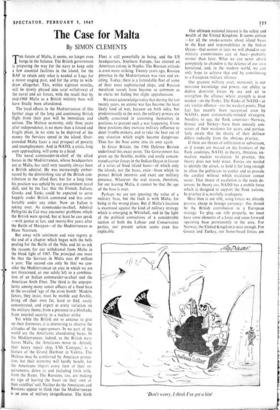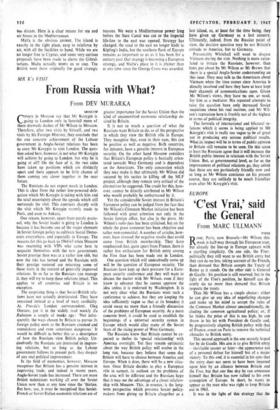The Case for Malta
By SIMON CLEMENTS THE future of Malta, it seems, no longer even hangs in the balance. The British government is preparing the way for the navy to keep only a few essential facilities in the island, for the RAF to retain only what is needed at Luga for a minor staging post, and for the army to with- draw altogether. This, within eighteen months, will be slowly phased into total withdrawal of the naval and air forces, with the result that by mid-1968 Malta as a British military base will have finally been abandoned.
The local effects in the Mediterranean of this further stage of the long and continuing British flight from their past will be immediate and serious. The Maltese economy, only three years after independence, is no more than a forced and fragile plant, in no state to be deprived of the money the Services spend in the island. Over- crowded Malta faces a real prospect of poverty and unemployment. And in NATO, a crisis, long seen approaching, will come to a head.
The naval commander-in-chief of the allied forces in the Mediterranean, whose headquarters are at Malta, has until very recently always been a British admiral. He was increasingly embar- rassed by the diminishing size of the British con- tribution to the allied fleet, but for a long time his position was upheld by our pre-eminent naval skill, and by the fact that the French, Italians, Greeks and Turks could be expected to serve happily tinder British command and less com- fortably under any other. Now an Italian is taking over. As commander-in-chief, Admiral Pellegrini da Coi may encounter problems which the British were spared, but at least he can speak —with justice at last, and twenty-five years after the Battle of Matapan—of the Mediterranean as Mare Nostrum.
But away with sentiment and vain regrets at the end of a chapter which began with the bells pealing for the Battle of the Nile, and let us ask the reasons for our withdrawal from Malta in the bleak light of 1967. The principal one must be that the Services in Malta cost £9 million a year. The second can only be that we con- sider the Mediterranean an area in which we are not threatened, or one safely left to a combina- tion of an Italian commander-in-chief and the American Sixth Fleet. The third is the unpopu- larity among many senior officers of a fixed base in the so-called 'age of the atom bomb.' Modern forces, they insist, must be mobile and flexible, living off their own fat, hard to find, easily concentrated, and expert at every variation on the military theme, from a presence to a blockade, from internal security to a nuclear strike.
Yet while the British are so anxious to give up their fortresses, it is interesting to observe the attitudes of the super-powers. In no part of the world are the Americans abandoning bases. In the Mediterranean, indeed, as the British navy leaves Malta, the Americans move in. Already their heavy repair ship, USS 'Canopus,' is a feature of the Grand Harbour in Valetta. The Maltese may be comforted by American protec- tion, but their economy will hardly benefit, for the Americans import every item of their re- quirements, down to and including fresh milk, from the States. The Russians, too, are making no sign of leaving the bases on their own or their satellites' soil. Neither do the Americans and Russians appear to think that the Mediterranean is an area of military insignificance. The Sixth Fleet is still powerfully in being, and the US headquarters, Southern Europe, has created an American colony in Naples. The Russian attitude is even more striking. Twenty years ago, Russian presence in the Mediterranean was rare and ex- citing. Today, there is a formidable fleet of some of their most sophisticated ships, and Russian merchant vessels have become so common as to excite no feeling but slight apprehension.
We must acknowledge today that during the last twenty years, an atomic war has become the least likely kind of war, because on both sides, but predominantly in the west, the military powers are chiefly concerned in stationing themselves in positions to prevent such a war happening. From these positions they exercise military influence to deter trouble-makers, and to take the heat out of any situation which might become dangerous. Thus has the base come into its own again.
In Great Britain, the 1966 Defence Review underlined this exact point. The Government has given up the flexible, mobile and easily concen- trated carrier forces in the Indian Ocean in favour of a series of fixed island bases—of which only the islands, not the bases, exist—from which to protect British interests and exert our Military presence. Whatever the real reason, therefore, for our leaving Malta, it cannot be that the age of the base is over.
Perhaps we are not ignoring the value of a military base, but the fault is with Malta, for being in the wrong place. But if Malta's location is examined against the kind of military strategy which is emerging in Whitehall, and in the light of the political convictions of a considerable section of both the Labour and Conservative parties, our present action seems even less explicable.
'Don't worry, 1 think I've got a bite'
Our ultimate national interest is the safety and wealth of the United Kingdom. It seems certain —for all the smoke-screens about island bases in the East and responsibilities in the Indian Ocean—that sooner or later we will abandon our military commitments east of Suez—probably sooner than later. What we can never allo:d completely to abandon is the defence of our cm n homeland, and, in the modern world, we can only hope to achieve that end by contributing to a European military alliance.
Our greatest military asset, moreover, is our maritime knowledge and power, our ability to deploy deterrent forces by sea and air to strengthen the alliance where strength is most needed—on the flanks. The flanks of NATO—or any similar alliance—are the weakest points. That fact has recently been recognised even by NATO's most continentally-minded strategists. Needless to say, the flank countries—Norway, Greece and Turkey—have been uneasily con- scious of their weakness for years, and particu- larly aware that the theory of their defence differs radically from the obvious practice.
If there are threats of infiltration or subversion, or if troops are massed on the frontiers of the flank countries, NATO, in theory, threatens im- mediate nuclear retaliation. In practice, this theory does not hold water. Forces are needed to identify the attack, to hold it for long enough to allow the politicians to confer and to provide the catalyst without which escalation cannot occur. That threat of escalation is the main de- terrent. In theory too, NATO has a mobile force which is designed to support the flank nations. In practice it is woefully inadequate.
Here then is our role, using forces we already possess, cheap in foreign currency: this should be the British contribution to a European strategy. To play our role properly, we must have some elements of a force and some forward operating base permanently in the area. For Norway, the United Kingdom is near enough. For Greece and Turkey, our home-based forces are too distant. Here is a clear reason for sea and air forces in the Mediterranean.
Malta is the obvious answer. The island is exactly in the right place, easy to reinforce by air, with all the facilities to hand. While we are no longer free in Cyprus, and some very curious proposals have been made to alarm the Gibral- tarians, Malta actually wants us to stay. The British went there originally far good strategic reasons. We were a Mediterranean power long before the Suez Canal was cut or the imperial life-line to the east was opened. Strategy has changed, the road to the east no longer leads to Kipling's India, but the southern flank of Europe remains as important to us as it has been for a century past. Our strategy is becoming a European strategy, and Malta's place in it is plainer than at any time since the George Cross was awarded.































 Previous page
Previous page